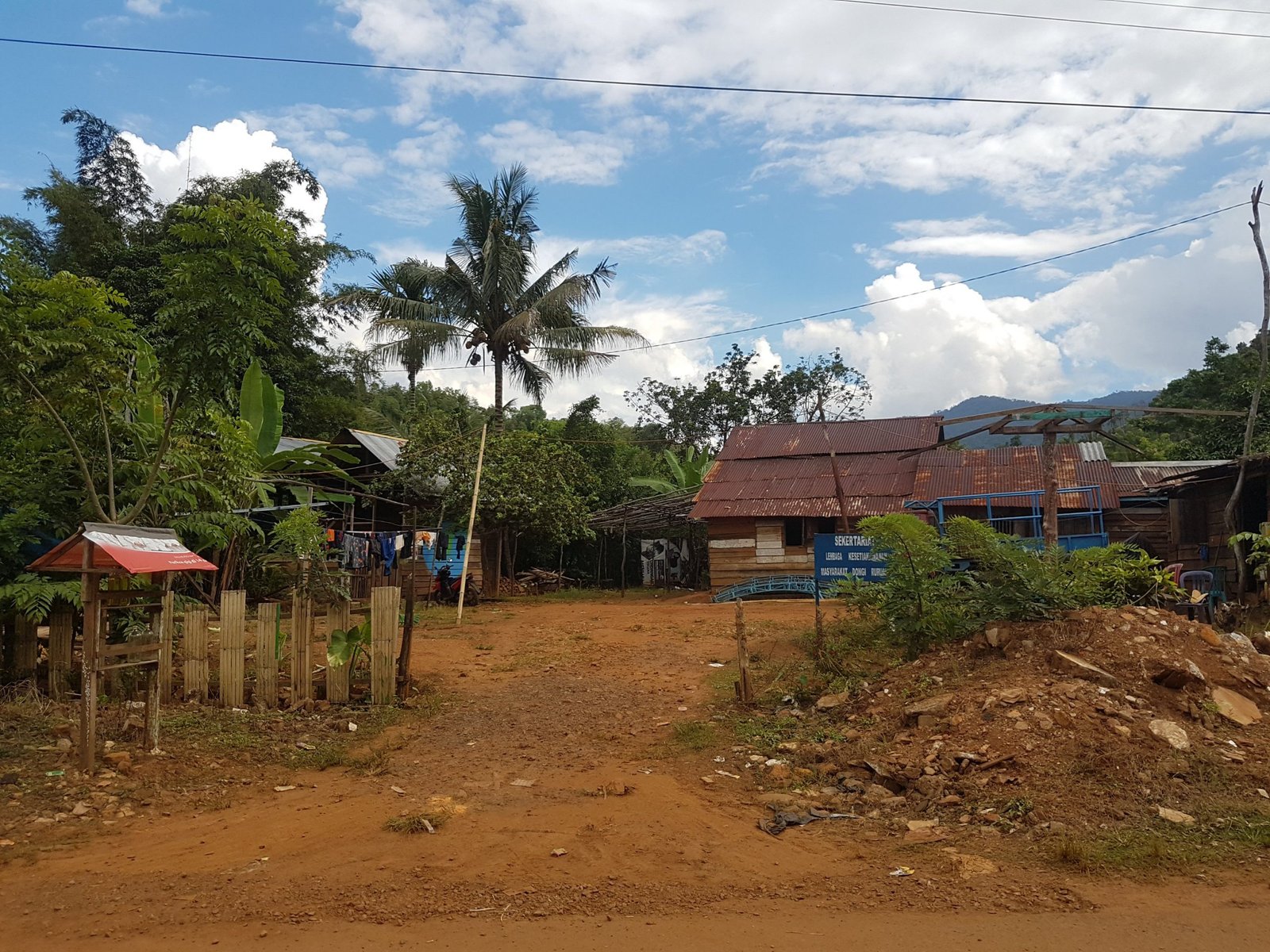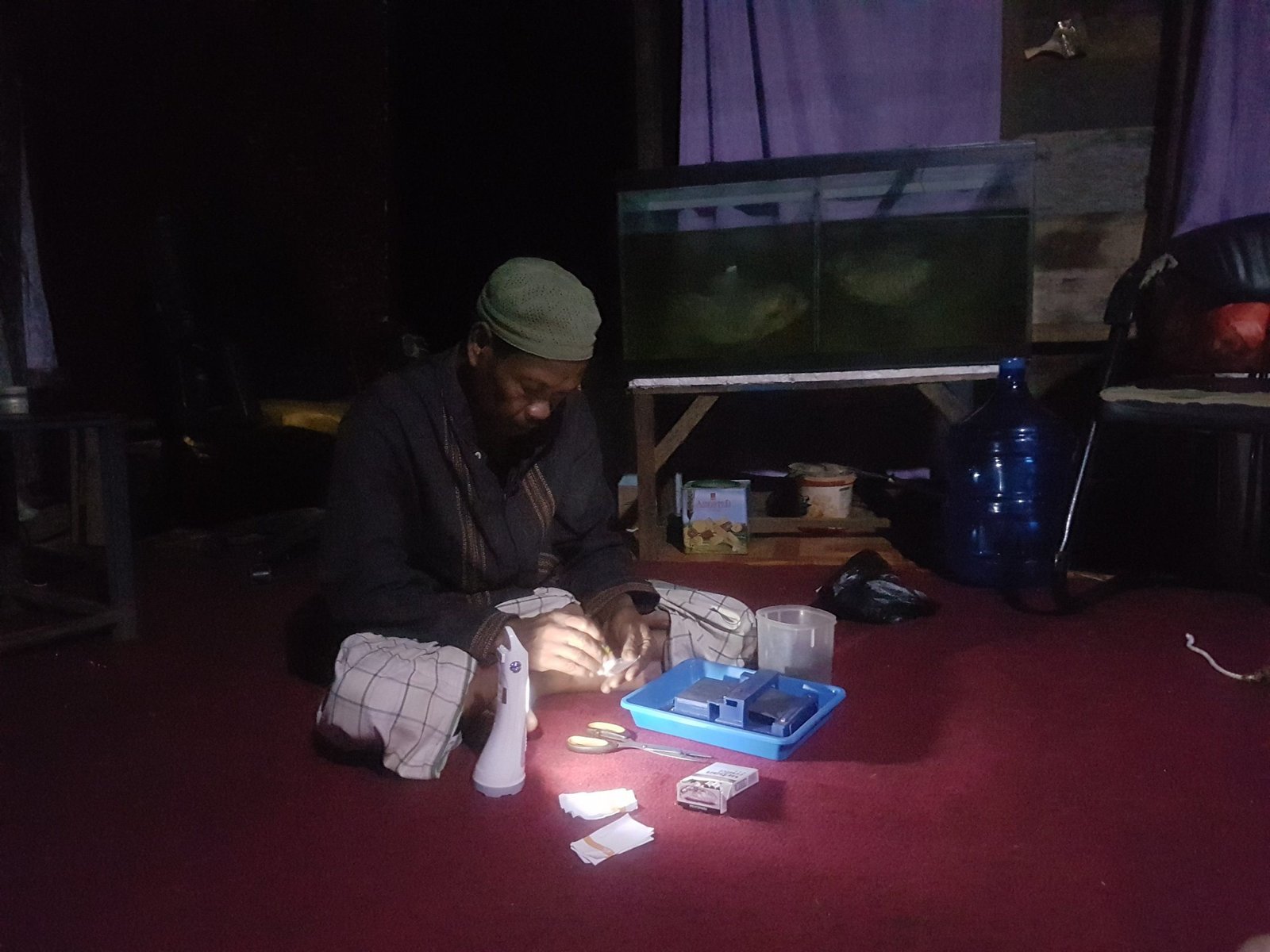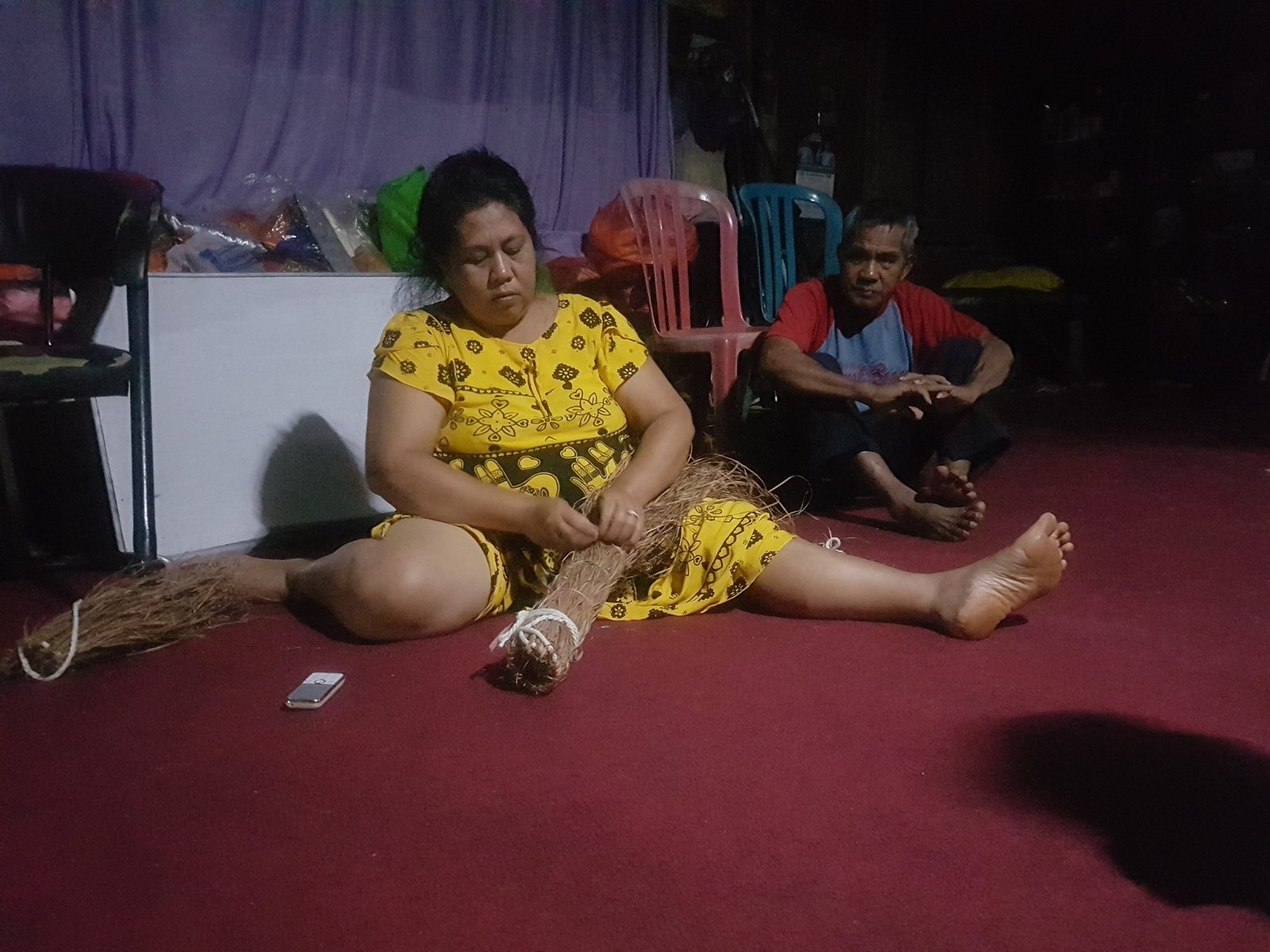I’m under instructions from Ibu Salma to call her before I leave – she will come and show me the way to her house, and we will have coffee. Her warmth and her will are both irresistible forces, so I do as I’m told. I’m also pleased to have discovered another person who is as committed to the drinking of coffee as I.
Soon I’m trailing Ibu Salma’s scooter away from the lake, past the neat curbs of mining company suburbia, past the security guards and the boom gates. We turn off the smooth tarmac onto a clay road, and the houses here are ramshackle constructions; there are chickens, and glass bottles of petrol for sale beside the road, and children running around, and now here is Ibu Salma’s house.

Chez Ibu Salma
There are children everywhere. They’re mostly not hers, but Ibu Salma encourages the local children to come to her house. She is teaching them all traditional dances in the style of the orang Dongi, one the original peoples local to this area. She bosses the children, and fusses over them, and feeds them. It’s a good scene.
As promised, Ibu Salma makes us coffee, and one of the small children is dispatched with a few thousand rupiah to buy deep fried bananas. They’re hot and crispy and sweet; my favourite. I’m sitting in the front room, and two of the littlest girls plant themselves in front of me and start practicing a dance that they’ve been learning; it’s all careful foot movements and delicate wrist flourishes, and I’m frankly impressed.
Most of the room is open to the outside, but on the sheltered side there is a big glass cabinet, stacked high with brightly coloured satins and sparkling fabrics in the brightest shades of pink and yellow and blue. This is Ibu Salma’s side-gig, a wedding hire business, where she loans out the extravagant table cloths and chair covers and glittering gowns that festoon local weddings. Subtlety is not highly valued on such occasions.
The stacked cabinet also serves as a wall; along with some curtains, it closes off the other side of the room where the family sleep. The whole house is makeshift; floors dropping to a different level from room to room; short on doors and windows; no bathroom, just an enclosed space at the back with a running hose over the widely spaces slats of repurposed wooden pallets. When it gets dark, I will realise that there’s no electricity connection either. There’s a reason for all this, and I will learn it later.

Now, however, there’s movement in the background: Ibu Salma is corralling the children and decking them out in wreaths of fibrous vegetation, grass skirt style. Then the music starts, and I’m ushered outside for the performance proper. First the girls dance, then the girls and boys together, the boys toting spears in solemnly executed choreography.

As the afternoon goes by, the solemnity lifts and the music gets more fun and the dancing less precise. Now the older people are joining in, and suddenly I’m wearing grass and some sort of flax headdress that keeps slipping over my eyes and they’re all trying to teach me to do the steps and I’m terrible at it, just terrible, and it’s hilariously fun.

Then the day is suddenly over and I haven’t ridden anywhere. Ibu Salma tells me to stay a while. There’s a room at the back of the house with some simple beds for visitors. She tells me that her house is very simple and apologises for it – but of course, there is nothing to apologise for. Her house is a home filled with warmth and generosity, and I feel grateful and privileged to be her guest.

As the daylight fades, and no lights come on, Ibu Salma explains to me the precarious history of the Dongi people. Originally from the mountains, the orang Dongi had been living around the shores of Lake Matano along with the other local people, the orang asli Sorowako, for maybe a century or so. The orang Dongi converted to Christianity; the orang asli Sorowako are Muslim. No problem, until the 1950s when the Darul Islam rebels seized control of the whole district and deported everyone – orang Dongi and orang asli Sorowako, everyone – to the other side of the lake. In 1959 the Indonesian army put down Darul Islam and liberated the people. The orang Dongi fled to the coast.
By the time they came back, Canadian nickel miner Inco had secured rights over a vast swathe of land and built the biggest open pit mine in Indonesia. They had razed the old orang Dongi village and constructed a golf course in its place.
Indeed; I look across the road and there is the golf course, improbably green and incongruous from where I’m standing, on a dirt road in a village that has no electricity. Unable to resettle on their traditional land, the returning Dongi set up makeshift dwellings here while they campaigned to get their land back. This is an illegal squatter settlement and the people here live in a state of impermanence, knowing that they could be made to leave at any time. This why the houses have no foundations, no bathrooms.
For its part, the mining company is said to have accidentally cut the electricity to the village while working on the road last year. It has not been reconnected.
Now I also understand why, a few nights earlier, I’d had that eery feeling of suddenly stepping into first world suburbia; why it was so weird to find all that empty, unused space where I camped among the trees on the lakeshore. Once you’ve been in Indonesia a while, you’ll realise that this sort of empty space is not normal – land is always being used by someone for something. I could sense something amiss.
It takes a long time for Ibu Salma to communicate this story, because she doesn’t speak English and my Indonesian is terrible. But with patience, we are able to gradually weave together the threads of understanding.

We sit in the dim glow of battery lights while Pak rolls his cigarettes for the next day and I help Ibu Salma prepare the fibrous bark for the dancers’ costumes.

You take your thumbnail and run it through the length of the bark, leaving one end unseparated. Repeat, repeat, repeat.

That was a good read. Just act like an aussie and walk around as you own the place.
I know, I got away with things I wasn’t even trying to get away with…
Thank you for your blogs! I enjoy reading them all. Come to America. I would be happy to host you.
Thank you Julie, I’m so glad you’re enjoying! I am really hoping I get to come over and ride north in the next few years. What town or region will I find you in? I will drop a pin on my map and send you an email when I’m headed that way. Thank you!